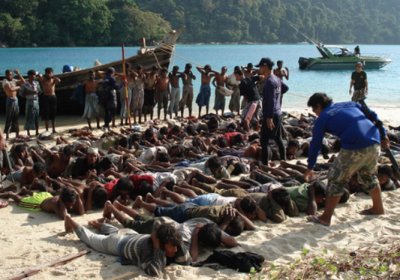November 19 marks the seventh anniversary of “the police murder of Mulrunji Doomadgee on Palm Island”, says Sam Watson, a prominent Queensland Murri leader and Socialist Alliance member.
In Brisbane, supporters of Aboriginal rights will rally that day to demand governments implement all 339 recommendations of the 1991 Royal Commission into Black deaths in custody.
Watson told Green Left Weekly: “It is important that Aboriginal people and their supporters mark this solemn day with a rally and march to continue our urgent call for justice for all Aboriginal deaths in custody.
Analysis
Stop the War Coalition Sydney, Sydney Solidarity for Bradley Manning and Peace Bus released the open letter below on November 17.
* * *
An open letter to the President of the United States Barack Obama & Prime Minister Julia Gillard on the occasion of Barack Obama’s address to the Australian Parliament on November 17, 2011.
While you meet in Australia’s Parliament House, Australians concerned about human rights, peace, justice and equality protest against your policies.
Officially, the announcement that 2500 US marines would be permanently based in Darwin had nothing to do with China.
Announcing the new military agreement with Australia on November 16, US President Barack Obama said: “I think the notion that we fear China is mistaken. The notion that we are looking to exclude China is mistaken … We welcome a rising, peaceful China.”
Don’t be fooled by their smiles. Ignore the trivia about “best friends” and crocodile insurance. This is about guns and money, about preserving the “right” of the richest 1% to exploit the world.
Non-profit climate research group Beyond Zero Emissions (BZE) has slammed global engineering company WorleyParsons, saying the firm has suppressed a damning report into the emissions produced by coal seam gas (CSG) mining.
Occupy Adelaide's November 8 general assembly adopted the document below by consensus.
* * *
We, Occupy Adelaide, are an open and evolving group engaged in the struggle for an equitable, inclusive and sustainable democratic society. We gather in solidarity with the world-wide movement opposing the power and greed of corporations which place profit over people, animals and the earth; self-interest over social justice; oppression over equality; and which control and corrupt our governments.
Aboriginal affairs minister Jenny Macklin released the Stronger Futures in the Northern Territory Report on Consultations on October 18. The federal government facilitated “community consultations” across the NT between June and August, discussing future policy toward Aboriginal communities after the Northern Territory Emergence Response (NT intervention) legislation expires in June next year.
Prime Minister Julia Gillard's arguments in favour of uranium sales to India are dangerous and dishonest.
She fails to even acknowledge the crucial problem – India's refusal to sign the Nuclear Non-proliferation Treaty (NPT).
The NPT is the main international nuclear treaty and is routinely described by Australian political leaders as the "cornerstone" of the non-proliferation system. The NPT has its flaws, not least the failure of the nuclear weapons states to take their disarmament obligations seriously, but that is no reason to junk the treaty or to disregard it.
Socialist Alliance Victoria released the statement below on November 14.
* * *
Support nurses, teachers, and state public sector workers — reject the Baillieu government’s bullying tactics
Before Ted Baillieu’s Coalition state government was elected, Baillieu made many promises. He said he would not do anything extreme like the Kennett coalition government of the 1990s.
NSW Greens MP David Shoebridge gave the speech below in NSW Parliament on November 11. It is republished from his blog.
* * *
The Occupy movement began with a single protest in New York on September 17, 2011, called “Occupy Wall Street”. This protest targets corporate greed and growing inequality across the globe. The protesters’ slogan “We are the 99%” refers to the vast disparity in wealth, particularly in the United States, between the wealthiest 1% and the rest of the country.
Open Letter from three prolonged Burmese detainees in Australian detention call for humanitarian intervention
Call for humanitarian intervention
We are recognised refugees of Burma. Our ethnic minority is unknown to the world, yet is one of the most oppressed minority group in Burma, the sole ethnic who has been declined any rights for an identity. We are de-facto stateless. Remember our race: we are Rohingyas.
- Previous page
- Page 423
- Next page











